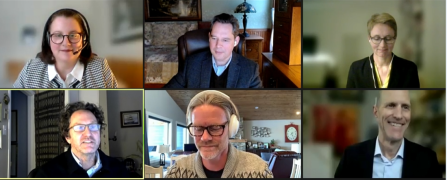Summary of IISD's event on carbon border adjustments
| Date |
Date
|

On December 15, 2021, TCB partner the International Institute for Sustainable Development (IISD) co-hosted an event with the Canadian Institute for Climate Choices, titled “Do countries need to cooperate on uncooperative CBAs?" Panelists discussed the feasibility of national Carbon Border Adjustments (CBA) in Canada and the US, the future possibility of a CBA between the US, Canada, and the EU, the innate geopolitical challenges that could prevent or incumber such an initiative, and how bilateral CBAs might provide a short-term means to surmount current political impediments to comprehensive, multilateral CBA schemes.
The event was opened by German Ambassador to Canada Sabine Sparwasser and moderated by IISD Senior Associate Aaron Cosbey. The Keynote was given by the Honorary Catherine McKenna, Principal of Climate and Nature Solutions. Panelists included McGill University Max Bell School of Public Policy Lecturer Ken Boessenkool; Senior Fellow in the Global Issues Division of the German Institute for International & Security Affairs, Chief Economist & Director General of Global Affairs Canada’s Trade Analysis Bureau Marie-France Paquet; and Deputy Director of MIT’s Center for Energy & Environmental Policy Research Dr. Michael Mehling.
CBAs have made their way into more and more federal climate policy discussions in countries around the world. In spite of their newfound popularity, however, their implementation is not a simple issue. In the Canadian context, Boessenkool highlighted that one of the biggest challenges to implementing a CBA is the province-governed structure of Canada's carbon taxes. Different provincial carbon prices would make establishing a national CBA extremely difficult — though not impossible — to implement. Heading south, in spite of the Biden Administration's vague plans for a federal CBA, Capitol Hill has included plans for such an instrument in its under-development Fair Transition Competition Act. "The legislation, which is designed to complement the Build Back Better Act, would serve to tax emissions created during the production of certain industrial goods: steel, aluminum, etc." explains Mehling. "Whether this will move forward is unclear but not improbable." McKenna was less optimistic: “What exactly is America doing that’s equivalent to a carbon border adjustment? Sector-specific taxes with virtually unlimited free allocations? Frankly, that isn’t equivalent; taxing emissions in certain industrial sectors isn’t enough. We need sweeping, fully equated adjustments. Bearing that in mind, we can’t let perfect be the enemy of good.”
The EU's carbon border adjustment mechanism (CBAM) is further developed than its Canadian and American counterparts, with the bloc releasing a proposal for the mechanism in July 2021. Sparwasser emphasized how critical CBAM developments will be for transatlantic relations. Though discussions have so far only focused on implications for the EU, moving forward involved actors will need to look at the international stage, she argues. Currently, the EU is still navigating geopolitical responses to its CBAM in the European neighborhood. Sabine also spoke to the international component of the EU CBAM, stating that how the EU ultimately positions itself on the instrument will be greatly influenced by the US. "The EU cannot go at this alone. A CBA will cause political tension between the EU on one side and Ukraine, Russia, and Turkey on the other. This is why the U.S.’ (and to some extent, Canada’s) ability to and willingness to support the EU’s initiative will determine its feasibility."
